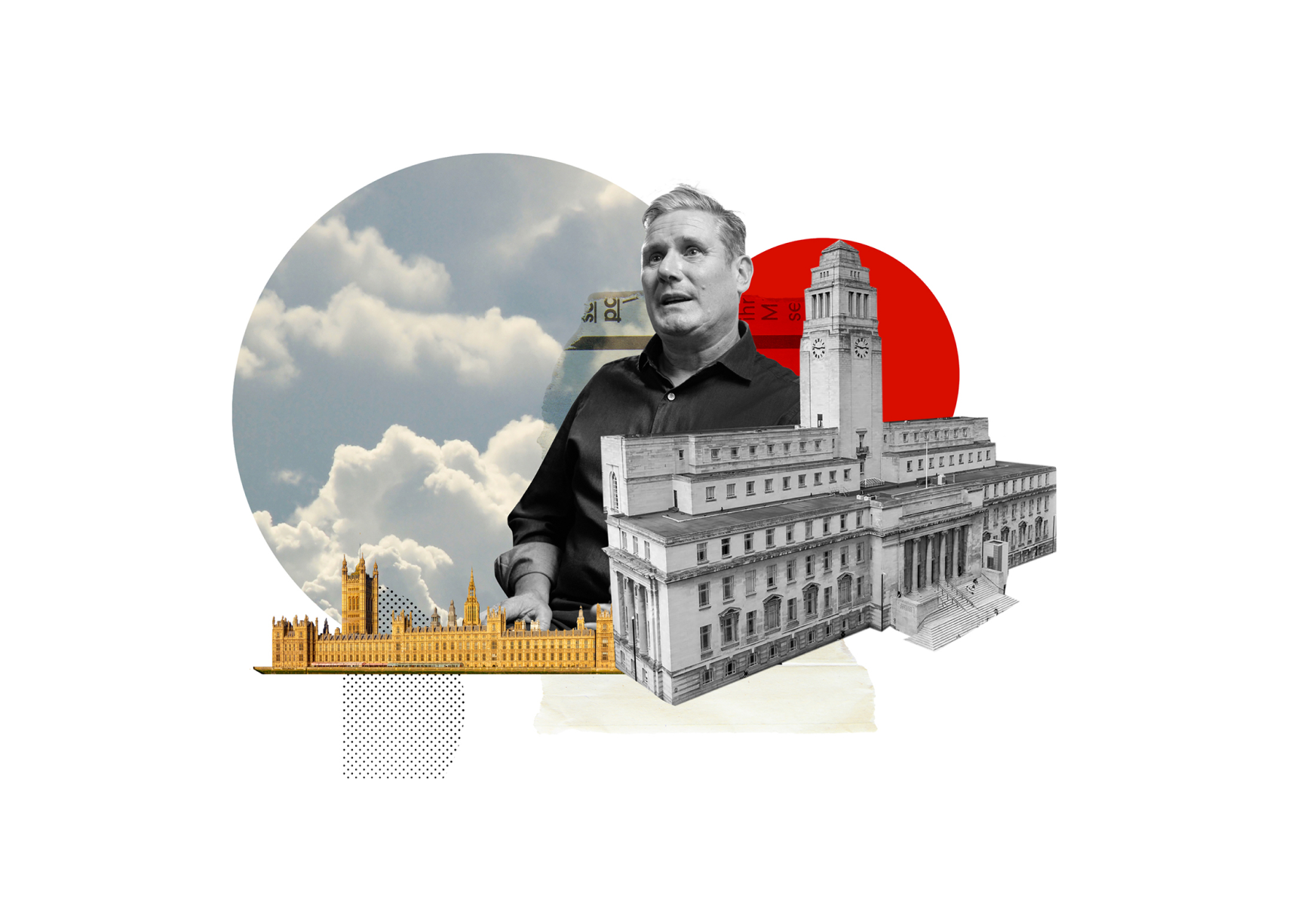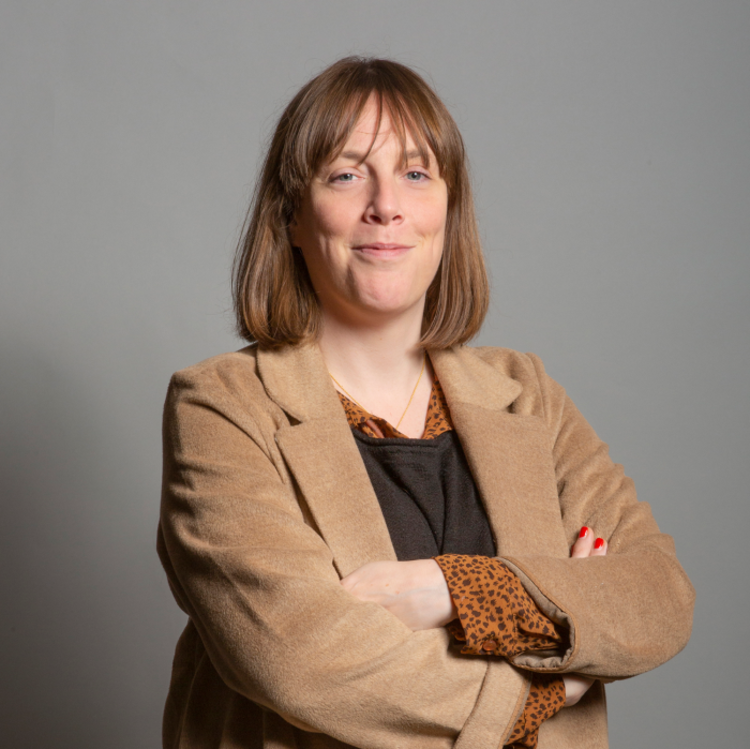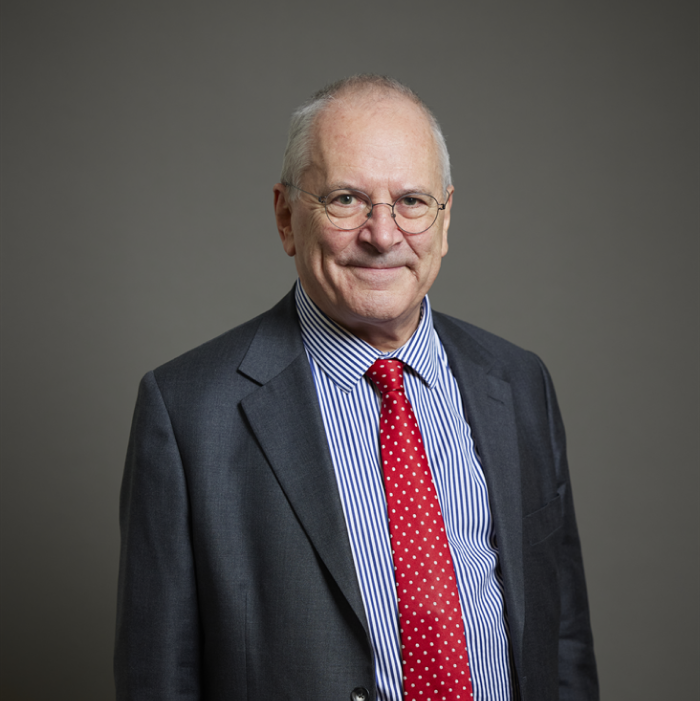LEEDS
IN
GOVERNMENT

Sir Keir Starmer’s Labour Party swept to victory in the UK general election, making him the first University of Leeds alum to take the keys to Downing Street. Could this lead to a more educationally diverse Government?
"Will you be the University of Leeds’s first Prime Minister?” The question was posed to Sir Keir Starmer (Law 1985, Hon LLD 2012) in October 2023, as he showed us around his old student haunts.
The lawyer-turned-politician had spent the last hour reliving his student days. As we walked around his old digs near Hyde Park, he regaled us with the tale of how a long-haired boy from rural Surrey transformed into an indie kid immersed in the sights, sounds and smells of Leeds.
He had been all too happy to discuss the three years that “changed my life”; that provided him with “an incredible platform to stand on in my life and my career”. But when asked whether he would take the keys to Downing Street, he was characteristically cautious.
“We mustn’t be complacent,” he said. “But the idea of returning to Leeds one day in a different capacity would be fantastic.”
On 5 July 2024, Keir became the 58th Prime Minister of Great Britain and Northern Ireland, and his story is quite distinctive, compared to many of his predecessors. He is one of only two University-educated prime ministers since Neville Chamberlain not to have studied their undergraduate degree at the University of Oxford.
“It’s always exciting when we get an alum in the Government that’s high-ranking, but when they get the top job it’s particularly exciting,” says Victoria Honeyman, Professor of British Politics at the University’s School of Politics and International Studies (POLIS).
“It’s also unusual. In many areas of life it is argued the old ideas of class and the old networks that come from Oxbridge have been broken down. However, in politics we haven’t seen much of that.”
Keir Starmer returned to Leeds in October 2023
Keir Starmer returned to Leeds in October 2023
The prevalence of Oxbridge graduates in Government has been well Documented. In 2020 social mobility charity The Sutton Trust stated 65% of Cabinet ministers in Boris Johnson’s government had been privately educated, and 50% of ministers had attended the elite institutions of Oxford and Cambridge.
Victoria explained this monopoly: “The reasoning behind it might be because they have networks of individuals within the parties, alumni from Oxford and Cambridge. It might be a particular type of confidence that is instilled in individuals from those establishments, which gives them an expectation that they can do these kinds of jobs, but also the visibility of people like them from those universities doing those jobs.”
But should we be concerned by this monopoly?
“Diversity of cabinet, and government is important,” Victoria said. “The first is aspirational; you have to see it to be it. If you want to encourage a wider diversity of people into politics, then you have to have people who break the ground to do it.
“More than that, politics impacts on everybody. If you as an individual look at a policy, inevitably you are going to view it through your own eyes and the way it would affect you. It’s far more difficult to view it through the eyes of somebody else, particularly when you don’t know anything about their lived experience.”
Encouragingly, The Sutton Trust has already described Keir’s Cabinet as “the most diverse in terms of education background ever recorded”. More than 90% of the Cabinet is state-educated, and 60% of ministers did not attend Oxbridge. And on top of that, five ministers studied at Leeds.
Alongside Keir, other Leeds alumni in Government include Home Office Minister Jess Phillips (Economic & Social History & Social Policy 2003), Chief Whip Sir Alan Campbell (PGCE Education 1979), Minister for State for Energy Security and Net Zero Lord Philip Hunt (Political Studies 1970), and Rail Minister Lord Peter Hendy (Economics and Geography 1975, Hon DLitt 2015).
Victoria said: “Leeds has a very diverse student cohort and has done for decades. You only need to walk around during Welcome Week to see lots of different people you know expressing their opinions. So if you have people who go to the University of Leeds or other universities that have experienced that, it broadens their perspectives enormously. And if those people are around the Cabinet table, hopefully you should get policies that are more diverse.”
The detail of policy of the new Labour Government is yet to be seen, but what affect does having a Leeds alumnus in Downing Street have on students?
“It is really exciting,” Victoria said. “It’s nice to be able to tell our students that somebody who sat in a position not that dissimilar to them, was able to go and take on one of the biggest jobs in the world.
“And we always get excited by the idea that we might be able to get him up for a visit to inspire the students at POLIS.”
Leeds alumni in Sir Keir’s top team
Alongside Sir Keir, four other senior members of Government attended the University of Leeds.

Jess Phillips
Jess (Economic & Social History & Social Policy 2003) was elected as Birmingham Yardley’s MP in 2015, and currently works as the Parliamentary Under-Secretary for Safeguarding and Violence Against Women.

Sir Alan Campbell
Sir Alan (PGCE Education 1979) has taken on the role of Chief Whip in Government, and though not strictly a cabinet member, attends its meetings. Before becoming an MP in 1997, he was a history teacher in Ashington.

Lord Philip Hunt
Lord Hunt of Kings Heath (Political Studies 1970) became a life peer in 1997 and served under Tony Blair and Gordon Brown. He is the current Minister of State for Energy Security and Net Zero.

Lord Peter Hendy
Baron Hendy of Richmond Hill (Economics and Geography 1975, Hon DLitt 2015) is the Government’s Rail Minister. He entered the Lords in 2022 and was chairman of Network Rail from 2015 until his appointment.
Watch the full interview from when Keir Starmer discussed his time at Leeds in 2023.
Video transcript — Made in Leeds: Keir Starmer discusses his time at university
